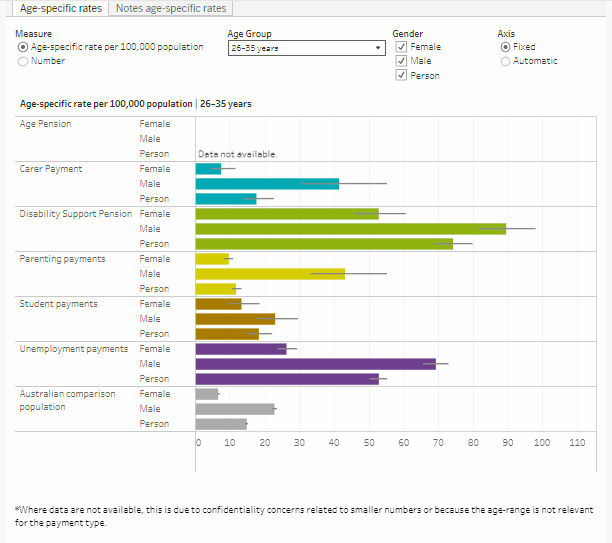The Guardian, 22 May 2024:
More than 30% of people who took their lives in 2019 were on welfare, AIHW says
The Australian Institute of Health and Welfare has just released some data that shows more than 30% of suicides in 2019 were people on the disability support pension (DSP) and newstart – despite being just 5.7% of the population.
During 2019, the most recent pre-Covid pandemic year, the age-standardised suicide rate among males who received unemployment payments was 2.8 times that of the male Australian population comparison. For females, it was 3.3.
During the same year, unemployment recipients accounted for approximately 20% of all suicide deaths among Australian males and females (across the same age range 15-66 years). Those on DSP were 14.5%.
The DSP recipient and Antipoverty Centre spokesperson, Kristin O’Connell, said:
The new figures on welfare recipient deaths by suicide are chilling, but reflect my all-too-frequent experiences supporting people who are planning to or have made an attempt as a result of dealing with “mutual” obligations or poverty.
Every government decision to leave us in poverty and subject people to abuse through “mutual” obligations is a decision that kills.
In 2020, Australia’s Mental Health Think Tank said the fastest and most effective thing the government could do to ease the mental health crisis was to keep the jobseeker payment at the poverty line.
The Morrison government plunged people back into deep poverty, and despite their claims to offer “cost of living relief” the Albanese government has continued the brutal welfare policies that led to these alarming suicide rates and widespread harm in our communities.
The wider picture also supports the assertion that welfare recipients of workforce age as a cohort are experiencing higher levels of suicide than the Australian population and, within that cohort those receiving disability or unemployment income support show the highest suicide rates. With a higher suicide rate than the general population continuing into old age for those receiving disability income support.
Australian Institute of Health and Wellbeing, Suicide & self-harm monitoring, Supporting people who experience socioeconomic disadvantage: Deaths by suicide among Centrelink income support recipients, retrieved 22 May 2024:
Age-specific rates of suicide among those who received income support payments between 2011 and 2021
AIHW, 15 August 2023:
Deaths by suicide, by socioeconomic areas
From 2001 to 2022, age-standardised suicide rates were highest for those who lived in the lowest socioeconomic areas (most disadvantaged areas), and generally decreased as the level of disadvantage lessened.
In 2022, the suicide rate for people living in the lowest socioeconomic (most disadvantaged) areas (18.4 deaths per 100,000 population; Quintile 1) was more than twice that of those living in the highest socioeconomic (least disadvantaged) areas (8.2 deaths per 100,000 population; Quintile 5). Similarly, the number of deaths by suicide generally declined as socioeconomic disadvantage decreased.
Overall, age-standardised suicide rates increased for those living in the lowest socioeconomic areas (Quintile 1); from 14.0 deaths per 100,000 population in 2001 to 18.4 deaths per 100,000 population in 2022. In contrast, smaller change was observed for those living in the higher socioeconomic areas (Quintiles 4 and 5). [my yellow highlighting]
The Coronavirus Supplement was introduced in April 2020 and abolished in April 2021. Then COVID-19 Disaster Payments were announced in June 2021 and withdrawn in November 2021 placing increased financial stress on up to 2 million people. The Reserve Bank Cash Rate Target began to rise on 4 May 2022 and kept on rising - swiftly exacerbating a cost-of-living squeeze into an escalating crisis.
Although the causes of individual suicides can be complex, it is hard to resist seeing an economic policy correlation with the rising suicide rate between 2021 and 2022. It is also hard to avoid viewing entrenched poverty as being heavily influenced by federal income support policy decisions.














